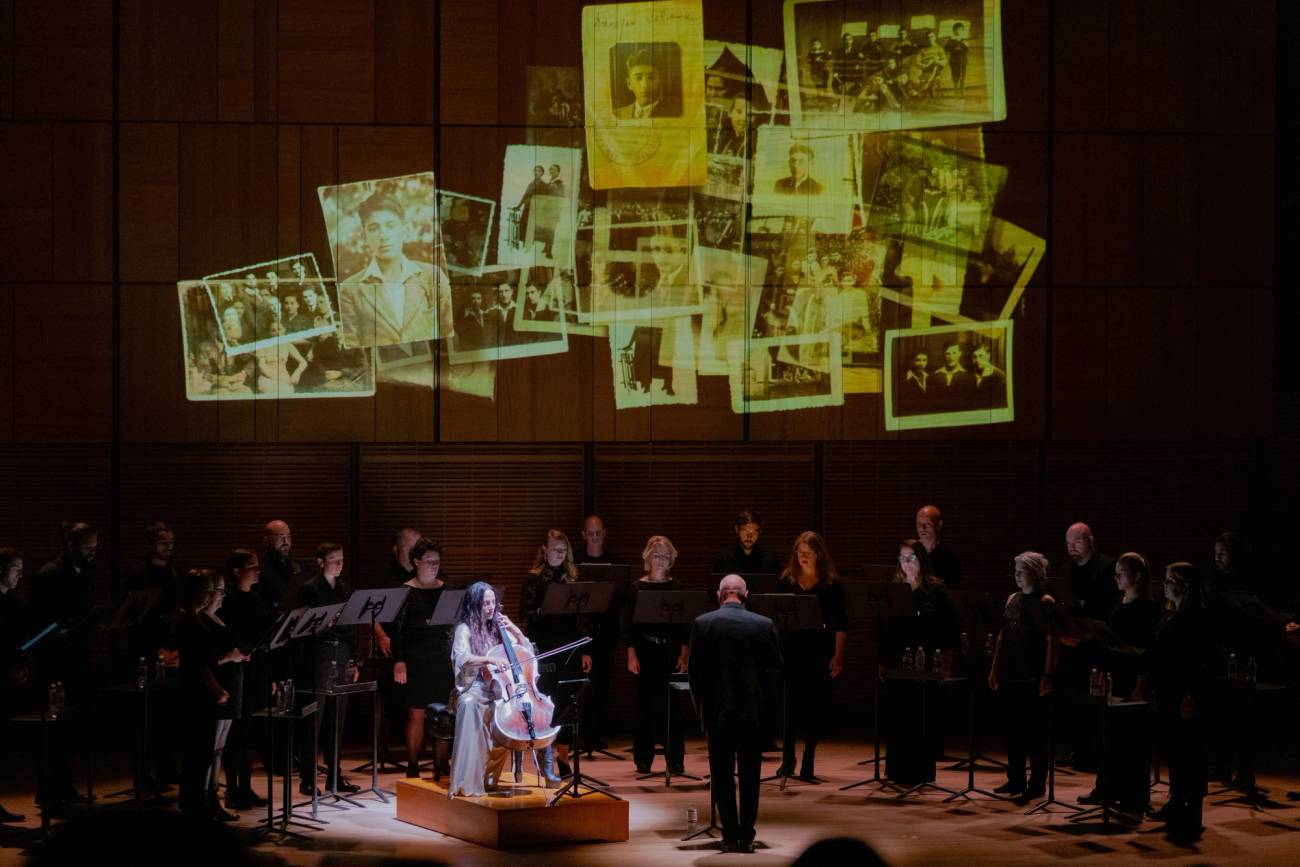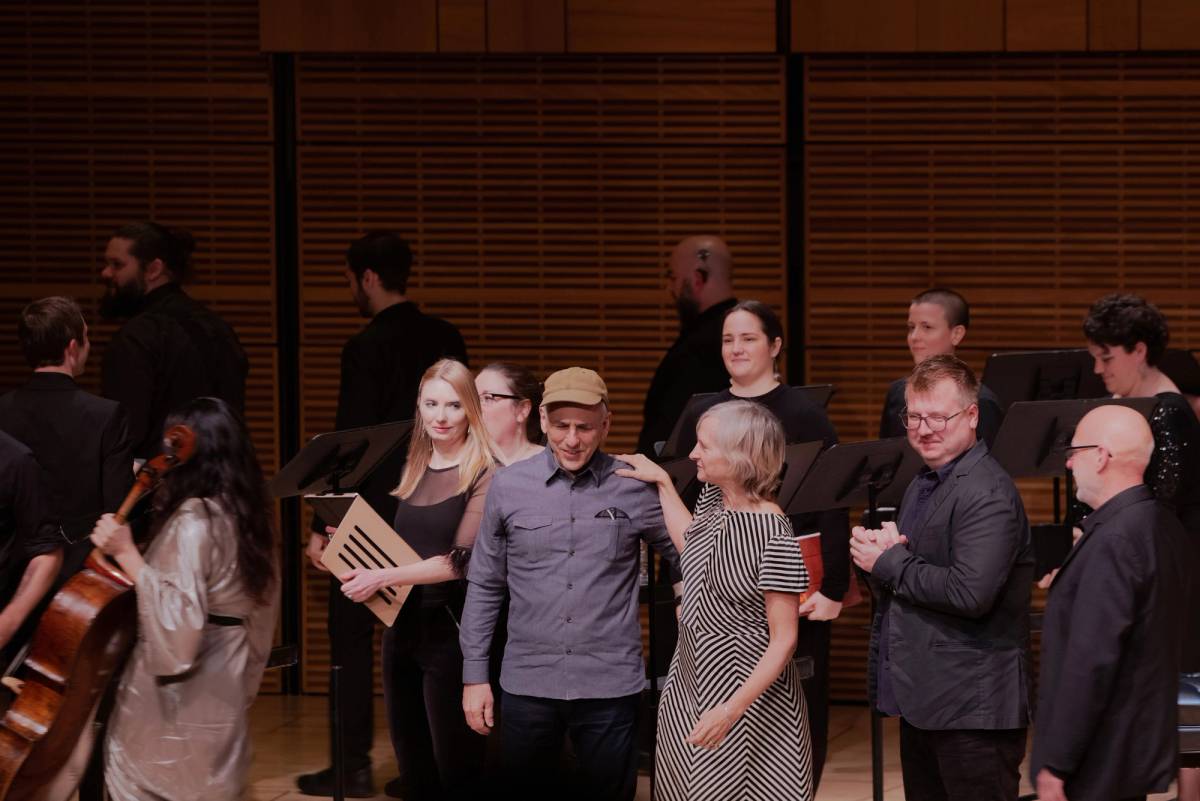A Jewish Family Mystery at Carnegie Hall
Music fills the gaps in a narrative of diaspora



Last month at Carnegie Hall, the composer Michael Gordon presented an evening-long work titled “The Travel Guide to Nicaragua” that made a strong case for bringing Jewish family history into the concert hall. In this moving and intricate piece, music becomes a powerful medium that can not only fill in the gaps left by the inadequacies of language but also expressively mirror them. Written for the mesmerizing chamber choir The Crossing and the blisteringly dramatic cellist Maya Beiser, the work also speaks to the communal ownership of inherited trauma, with coolly kaleidoscopic vocal textures shot through with the cathartic warmth of the cello.
Gordon, who is one of the founders of the new-music collective Bang on a Can, is a master of de-familiarized sounds. His catalogue includes hypnotic works in which analog instruments—a set of wooden planks, an ensemble of bassoons—come to sound like pixelated electronics. Here, it is the voices that are spliced and distributed among the chorus in waves of spatialized sound.
The vocal writing in “Travel Guide” is poised and precise to the point of seeming remote. It falls to the cello—played with theatrical touches by Beiser —to emote, with anxious fingernail strumming and scorching laments. In a passage about the Nazi massacres of Jews in Gordon’s ancestral shtetl, the keening, impassioned cello takes on the role of a professional mourner brought in to tear through the shocked silence. Later, as Gordon tries to piece together a patchwork of unreliable memories about his grandfather’s Nicaraguan life, the singers proceed in halting staccato while, underneath, the cello wonders and dreams.

On the Sunday following the performance at Carnegie Hall, I paid Gordon a visit at the Tribeca apartment he shares with his wife, the Pulitzer-winning composer Julia Wolfe. I recognized the shoebox he had set out on the table from the video projections. Next to it lay a thick black book lettered in Hebrew: a Yizkor volume dedicated to the murdered Jews of the village Gordon’s family had escaped. As Gordon, who is soft-spoken and reticent, spread out the black-and-white photos, he apologized for the constant barking in the background from his COVID-traumatized dog.
“He would look at this picture and he was unable to speak,” Gordon said, gazing down at a snapshot of insouciant youngsters with unruly hairstyles that probably stemmed from his father’s time at the Yiddish Technicum in Vilna, Lithuania. “He would glaze over almost in paralysis. I could maybe show him three or four pictures, and then he would say, ‘Put it away.’”
Gordon said he had few musical models to work from. The only other contemporary composition inspired by Jewish memoir he could think of was Steve Reich’s tensely propulsive “Different Trains.” Concert music, Gordon says, “is a strange medium for this sort of story.”

His own composition proceeded in fits and starts. He finished one version in time for a planned premiere in early 2020. During the pandemic, he picked it apart and reworked it, incorporating a reference to a chance encounter with a volunteer at the Diaspora Museum in Israel. The woman turned out to be from the same town as his grandfather and had known his brother. She had survived the war in the woods, fighting alongside partisans.
Gordon said he hadn’t embarked on the creative process in order to come closer to the truth about what had motivated his grandfather to abandon his family, and his grandmother to leave one child behind in pursuit of him. “It’s not that important to me,” he said. “The truth I know is my parents. Those are the people I know.” As the memoir took shape as a concert piece, he removed place-names and other identifiers so that listeners could project themselves into the music.
“I feel it’s my story,” Gordon said, “but it’s also a story. It’s not only a Jewish experience. It’s an experience that a lot of people who have undergone displacement have had.”
The closing confetti of musical motifs in Gordon’s piece seems to capture a truth about memoir writing itself: that just as family history is pieced together by many, the narrative form is inevitably some kind of collage.
Corinna da Fonseca-Wollheim is a music critic and writer living in Westchester.